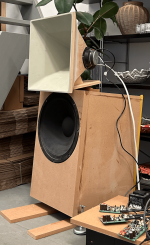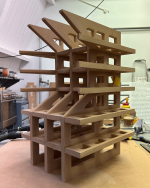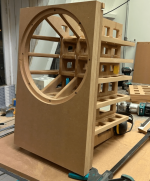Hi,
I am working on a speaker set for home use. I've already build the unity horns a while ago and pairing them with Faital Pro 15pr400 bass drivers (see pictures)
The cabinet is a bit over-constructed but it was fun making it... I finished one of them and filled it with damping wool. BUT this is where I need some help; The inside walls are just plain mdf, not covered so a lot of reflections inside... The cabinet is too dense with bracing to be able to reach all spots to cover them in any damping material... and I can not open the cabinet; everything is glued and nailed into place..
Ideally I would cover the inside walls with some bitumen pads but that would just be impossible due to the above reason... I could stuff it and glue the reachable parts with melamine sponges or something similar..
Any tips on this?
I am working on a speaker set for home use. I've already build the unity horns a while ago and pairing them with Faital Pro 15pr400 bass drivers (see pictures)
The cabinet is a bit over-constructed but it was fun making it... I finished one of them and filled it with damping wool. BUT this is where I need some help; The inside walls are just plain mdf, not covered so a lot of reflections inside... The cabinet is too dense with bracing to be able to reach all spots to cover them in any damping material... and I can not open the cabinet; everything is glued and nailed into place..
Ideally I would cover the inside walls with some bitumen pads but that would just be impossible due to the above reason... I could stuff it and glue the reachable parts with melamine sponges or something similar..
Any tips on this?
Attachments
Holy Mackerel ... 🙂
I'd get some fiberglass batts (looks like 3-1/2" would do the trick) and cut them to fit inbetween the windowing. Don't smash the FG to fit it in. Try to get some into the lower section of the enclosure through the windows.
I'd get some fiberglass batts (looks like 3-1/2" would do the trick) and cut them to fit inbetween the windowing. Don't smash the FG to fit it in. Try to get some into the lower section of the enclosure through the windows.
Is the internal skeleton pressed against the magnet? What frequency range do you plan on running the woofer up to, and what XO slope?
In my upcoming build I'm planning on mounting the drivers on external stands, so the only connection between the box and the speaker is a secondary surround for air tightness. Centring the 2 pieces may be a bit fiddly, but that's the price for stopping the box from vibrating from reaction forces.
In my upcoming build I'm planning on mounting the drivers on external stands, so the only connection between the box and the speaker is a secondary surround for air tightness. Centring the 2 pieces may be a bit fiddly, but that's the price for stopping the box from vibrating from reaction forces.
Nah, it's just about right. My last Unitys were built the same way, just WUW.The cabinet is a bit over-constructed
It's effective to keep the damping material away from the walls, where the sound has a higher velocity.The inside walls are just plain mdf, not covered
It's not necessary to fill the cabinet, just to intercept the modes with a sufficient quantity.to be able to reach all spots
Generally speaking...

Good plan, the pioneer's original choice till the 'bean counters' did away with it. They used what appeared to be skinny bicycle inner tubes and saw one setup with what appeared to be a leather variant and one that just had a feeler gauge tiny air gap, presumably empirically 'tuned' to either the right Q or so resistive as to be near enough sealed, so might want to consider this as an option.In my upcoming build I'm planning on mounting the drivers on external stands, so the only connection between the box and the speaker is a secondary surround for air tightness.
Hi, it’s not pressing against the magnet just a small clearance of 2cm approx. It’s crossed at 300hz with the horns, no definite slope yet; I’ve had no time measuring them so did the crossover by hearing.Is the internal skeleton pressed against the magnet? What frequency range do you plan on running the woofer up to, and what XO slope?
In my upcoming build I'm planning on mounting the drivers on external stands, so the only connection between the box and the speaker is a secondary surround for air tightness. Centring the 2 pieces may be a bit fiddly, but that's the price for stopping the box from vibrating from reaction forces.
I think I can reach a good part around the driver with these bitumen slaps. I’ll give that a try.. the rest I can fill up with polyester damping (from pillows). The cabinets are about 115 liters netto, what is a good amount of infill for that?
What I mean by bitumen pads see picture:
Thanks for all the reply’s
What I mean by bitumen pads see picture:
Thanks for all the reply’s
Attachments
Don't expect too much from the bitumen. You build a perfect enclosure and it does not help much in the low region you will use it.
Just stuff polyester pillow inside, this will enlarge the virtual volume and damp any echo. Stuff means fill it completely, but do not compress it too much.
To find the best amount used, do some impedance tests, the lowest Fs is the optimum, giving the largest virtual volume.
If you have polyester in sheet form, cut a piece that separates the driver from the loose stuffing and position it before closing the cabinet.
A really nice build, such good work is not seen that often. Congratulations!
Just stuff polyester pillow inside, this will enlarge the virtual volume and damp any echo. Stuff means fill it completely, but do not compress it too much.
To find the best amount used, do some impedance tests, the lowest Fs is the optimum, giving the largest virtual volume.
If you have polyester in sheet form, cut a piece that separates the driver from the loose stuffing and position it before closing the cabinet.
A really nice build, such good work is not seen that often. Congratulations!
- Home
- Loudspeakers
- Multi-Way
- Faital Pro bass cabinet + unity horns help needed



